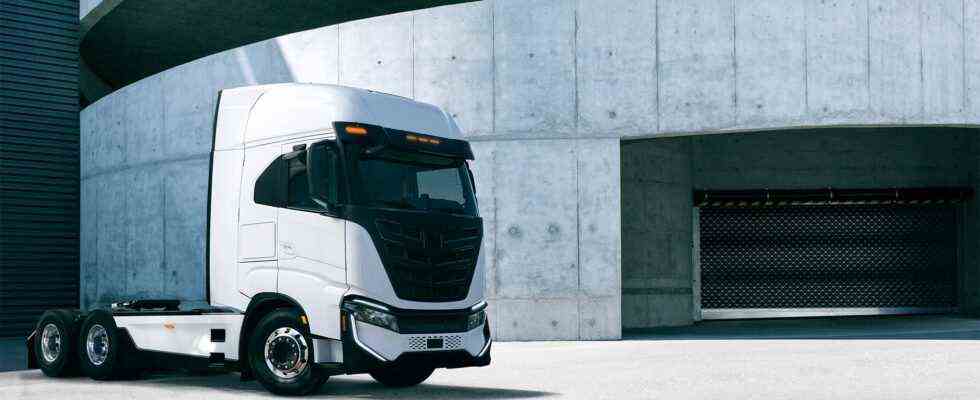Status: 15.09.2021 5:27 p.m.
IVECO and Nikola are building a new production facility for electric trucks in Ulm for 50 million euros. The first series production in Europe is to start at a quasi-historical site.
For IVECO boss Gerrit Marx, the opening of the new truck production facility in Ulm is a “highly emotional moment”. Not because one of the most modern electric trucks will soon be rolling off the assembly line here. It’s the past that catches up with the manager. Because truck production was actually buried here in Ulm years ago: after the euro and financial crisis, the last heavy-duty truck rolled off the assembly line on August 3, 2012.
Joint truck from US start-up and IVECO
The joy about the new start in Ulm is great. Especially since many former production employees are returning to their old workplaces, says IVECO boss Marx: “It was an easy decision for me to say: We are making the site a heavy-duty location again. This is a real production facility with a capacity of 3000 Trucks per year in three-shift operation. “
Instead of trucks with classic combustion engines, IVECO wants to produce one of the most modern battery-electric trucks on the market together with the US company Nikola in Ulm. The first 30 “Nikola Tre” – the model name – could already be built this year; initially only for export to the USA.
The presentation of the “Nikola Tre” in Ulm arouses public interest.
Above all, the Nikola Tre wants to impress with its range: With up to 560 kilometers per battery charge, the newcomer outperforms the recently introduced eActros from Mercedes (up to 400 kilometers), the fully electric Scania (up to 250 kilometers) or Volvos e-trucks available on the market (up to 300 kilometers). The Nikola Tre’s battery should be charged to 80 percent within two hours. This makes the truck particularly interesting for short journeys.
Is battery drive the future for trucks too?
It will still be some time before heavy goods traffic in Germany streams almost silently through the landscape: According to the Federal Motor Transport Authority (KBA), around 3.4 million trucks are registered in Germany, the vast majority (around 3.2 million) are diesel-powered On the way. The KBA only has around 32,000 fully electric trucks. That is less than one percent (0.94 percent) of all trucks registered in Germany. In comparison: Fully electric cars are numerically more frequently on German roads (around 309,000). In relation to all cars, this is only 0.64 percent.
“I firmly expect that electric drives will prevail in trucks,” says Anna-Lena Klingler from the Fraunhofer Institute for Industrial Engineering (IAO) in Stuttgart. “But I also expect a mix of technologies. That means: We will see battery-electric trucks very strongly, but also fuel cell vehicles.”
Success with a mix of technologies
Such a truck is to be built in Ulm from the end of 2023. Instead of diesel or gasoline, the driver then fills up with hydrogen and is independent of the range of a battery. “In the fuel cell, electricity is generated from hydrogen and oxygen,” says engineer Klingler, describing the process in the engine compartment. “And this electricity is then used to drive the electric motor. That means that the fuel cell truck is also an electric truck.”
In Ulm, people believe that they are on the right track with battery-powered and fuel trucks. IVECO boss Marx believes that the fuel truck could also be of interest to the industry, especially for longer journeys: “Hydrogen will then be used as a range extender. The diesel will be completely replaced, 15 to 20 percent biomethane (as a fuel Variant, editor’s note) will remain. ”
This project is enormously important for industry, says Marx with regard to the strict climate protection goals: “We have to reduce 15 percent CO2 by 2025, we have to reduce CO2 by 30 percent, probably more likely 50 to 55 percent, of newly registered trucks by 2030. And that is only possible electrically. “
So the electric fuel cell truck is the ideal vehicle for long-distance transport? Expert Klingler from the Fraunhofer Institute dampens expectations, because in terms of efficiency, “the battery-powered electric motor definitely does better,” because hydrogen must first be obtained with the help of electricity, “that is subject to a loss in efficiency,” said Klingler. A forwarding company is only climate-neutral if the hydrogen is also produced from renewable energies.
High costs and a lack of material dampen the euphoria
A completely different question is whether freight forwarders can even afford the ultra-modern electric trucks. The new eActros from Mercedes, for example, should cost around three times as much as a “normal” diesel truck. How expensive the Nikola Tre will be is still unclear.
Around 400 employees in Ulm hope to be able to start working on the truck soon. Because whether the targeted 30 vehicles will leave the production halls at all this year is not in the hands of the truck manufacturer. The joint venture between IVECO and Nikola, like the entire industry, suffers from a devastating semiconductor shortage.

